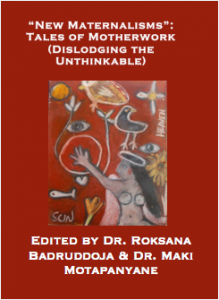 “New Maternalisms”: Tales of Motherwork (Dislodging the Unthinkable). Edited by Roksana Badruddoja & Maki Motapanyane (Demeter Press, 2016).
“New Maternalisms”: Tales of Motherwork (Dislodging the Unthinkable). Edited by Roksana Badruddoja & Maki Motapanyane (Demeter Press, 2016).
When academics focus on a concept that is rooted in a fundamental human experience, they often retreat to detached and aggressive scholarly postures. This natural defense against graying the lines between personal and professional can lead to the driest literature. The authors included in New Maternalisms clearly reject this approach, choosing instead to get their hands dirty while grappling with the sticky task of conceptualizing motherhood. Contributor Isabel Sousa-Rodriguez defines maternalism as a field of study, that ‘strives to explain the complexity of “mothering” – subdividing motherwork according to biological and social reproductive functions.’ This definition contrasts with that of the OG political movement , lending double entendre to the concept of a ‘new’ maternalism. Despite its jargon rich title, this collection of essays is personal and accessible.
The editors, (former CCF Boardmember) Roksana Badruddoja & Maki Motapanyane note academia’s historic failure to recognize the voices and agency of mothers. In response, they bring together a diverse collection of essays that explore the ways in which societal structures and culturally grounded ideologies prescribe definitions of good mothering and limit women’s agency. In turn, these works illuminate the perspectives, strategies and resilience of marginalized motherhood.
The list of authors could be considered a list of invitees to a maternalist scholar’s dream dinner party. Layering the voices of emerging scholars, expert practitioners from the field, and skilled theorists the collection of essays reads like a conversation among kindred spirits across disciplines. The editors’ openness to including scholars with diverse academic experience and personal backgrounds is a kindness not only to the emerging scholars included in the collection, but to the reader. At times fearlessly raw, the authors admit to and struggle with the limitations to their own views of mothering while exploring examples of motherhood across a diverse array of cultural contexts. The effect is refreshing.
The contributions challenge both patriarchal and feminist concepts of mothering. They do this by presenting the realities of mothering within the contexts of marginalized demographics (e.g. mothers who are undocumented, same sex, homeless, indigent, and/or who have disabilities) and marginalizing experiences (e.g. mothers who carry genetically engineered children, work in the sex industry, have their children conscripted as soldiers, or feed their babies formula, as opposed to breast feeding). The issues raised are at once timely, given recent Supreme Court cases (e.g. constraints experienced by mothers living in mixed immigration status families and mothers in single sex marriages) and timeless, such as mothers struggling with identity after the loss of a child.
In short, the editors give us an education in what Badruddoja names in her own contribution to the collection, “the unschooling that is deeply needed around our cultural imaginations of motherhood”. Transitioning through the chapters, I found myself relating to, sympathizing with, and being irritated by the authors. In other words, I found the collection both engaging and challenging. Based on my, admittedly, limited experience as an educator – and my shamelessly extensive experience as a student – that is what I’d call pedagogical gold.
Amy Thompson is a recovering policy wonk and a PhD student at the University of Texas at Austin School of Social Work. She is currently immersed in her comprehensive exams on the development of agency in migrant children – some of whom are mothers (biological and/or structural).

Comments